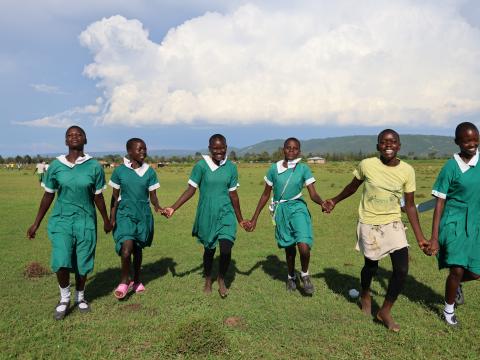Girls’ Empowerment at Women Deliver: the time to listen to girls as changemakers, and act on Ending Violence Against Children is NOW!

World Vision field and regional offices in Africa have long advocated to end harmful practices such as child marriage, female genital mutilation (FGM) and sexual violence as part of the organization’s It Takes A World to end violence against children, campaign. As we collaborate and advocate for the most vulnerable children, their families and communities, it is crucial to listen to the voice of empowered girls during the Women Deliver Conference, in Kigali this week.
Countries prioritising the elimination of child marriage (CM) include Chad, Ethiopia, Ghana, Kenya, Lesotho, Malawi, Mali, Mauritania, Mozambique, Niger, Senegal, Somalia, Tanzania, Uganda and Zambia. Other countries, including Rwanda and Burundi, have prioritized addressing teen pregnancy, sexual violence and physical violence.
Girls face negative social norms and harmful practices in some African countries. As a result, there is gender inequality in all spheres of life; social, political and economic. Social norms and practices such as violence against children (VAC), gender-based violence (GBV), harmful practices and female infanticide prevent girls from fulfilling their full potential. Unfortunately, humanitarian challenges such as drought and conflict have exacerbated VAC, leading to more teen pregnancies.
At least 200 million girls and women have experienced FGM globally. In Africa, FGM is practiced in 29 countries. In Ethiopia, Sudan and Somalia, FGM prevalence among girls and women aged 15-49 years stands at 65 per cent, 87 per cent and 99 per cent respectively.
The percentage of women between 20-24 years who were first married before the age of 18 is 31 per cent for East and Southern Africa and 37 per cent for West and Central Africa. Niger has the highest with 76 per cent. Other countries with high prevalence rates include Central African Republic and Chad 61 per cent, Mali 54 per cent, Mozambique 53 per cent and Burkina Faso and South Sudan, 52 per cent.
Child marriage, female genital mutilation, sexual and gender-based violence are all violations of international, regional and national child rights and human rights treaties. These include the African Charter on the Rights and Welfare of the Child and the Convention on the Elimination of Discrimination Against Women (CEDAW).
It is against this backdrop that World Vision is hosting a side event at Women Deliver Conference entitled, Girl’s Empowerment and Ending Violence Against Children, on 19 June, 2023. Children have the opportunity to influence decision makers and impact policy makers on keeping their commitments to end violence against children in their families, communities and society. Empowered girls are change makers.
Girls from Rwanda Uganda, Mozambique, DRC and Niger will share their experiences, catalyze collective action and hold leaders accountable in ending violence against girls including harmful practices such as child marriage, sexual violence and the challenge of teen pregnancy. These girls are champions on ending violence against children and change makers. This will culminate in a Manifesto or call to action by the girls to high level decision makers to ignite a global movement to end violence against girls.
Calls to Action:
- Increase investments especially by governments on social protection, provision of education and health services and economic strengthening in order to end diverse forms of violence against children.
- Strengthen partnerships amongst governments, donors and faith leaders for effective implementation of laws, policies and plans to end child marriage, FGM, sexual violence, teen pregnancy and children associate with armed groups.
- Keep governments accountable to the commitments made such as legislation, policies, standards and plans to protect children.
- Include children and women in decision making of national, regional and international policies, declarations and decisions.
- Address the conflict and climate change which are now interacting to create new and worsening hunger hotspots and reversing the gains families had made to escape poverty especially for the most vulnerable children.
Let us create space and empower girls to collectively voice their opinions on ending violence against children especially child marriage, sexual violence as well as addressing teen pregnancy. The time to act is now!
Article by Ruth Koshal, Regional Advocacy and External Engagement Director World Vision East Africa Region